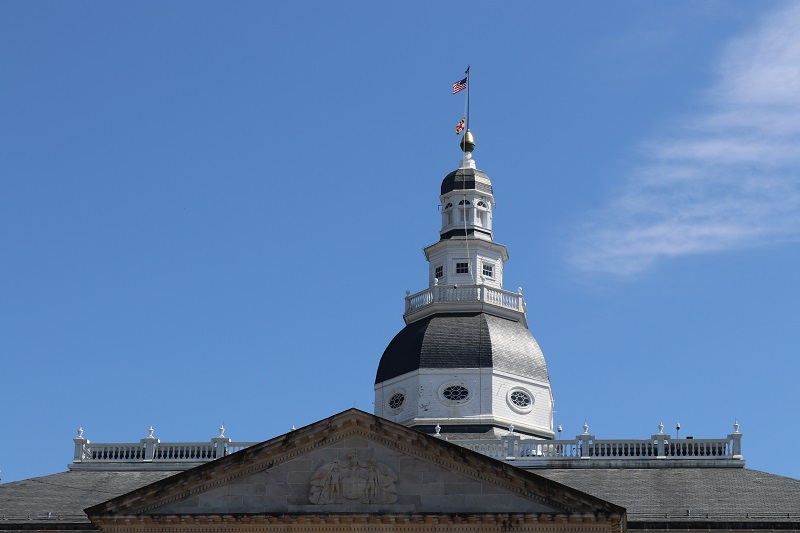Legislative Budget Panel Recommends Dipping into Reserves to Address Anticipated Shortfalls

A bipartisan panel of Maryland legislators has recommended tapping the state’s Rainy Day Fund to help close an anticipated budget gap in 2022.
The Spending Affordability Committee voted unanimously Tuesday on several recommendations to guide the state’s 2022 fiscal year budget, including to lower the recommended level of reserves in the state’s Rainy Day Fund by about $200 million.
The recommendation would leave about $1 billion in the reserve fund at the end of the 2022 fiscal year, an amount equal to 5 percent of state general fund revenues. Traditionally, 5 percent of revenue has been reserved in the Rainy Day Fund, but recently the state has been holding 6 percent.
While state’s budget process is largely driven by Gov. Lawrence J. Hogan Jr. (R), the Spending Affordability Committee is charged with making recommendations for state spending, new debt authorization and state personnel levels. Since the committee was created in the early 1980s, the legislature has nearly always followed its recommendations.
Legislative analysts believe the current fiscal year will end with a $778 million cash surplus, however, estimates drop to a $632 million cash deficit in the 2022 fiscal year, the budget lawmakers are tasked to pass this coming legislative session.
The additional allocation from the Rainy Day Fund and the surplus could help eliminate the deficit projected for 2022.
“There’s a lot of cash to help address the budget shortfall if necessary,” David C. Romans, fiscal and policy coordinator for the Department of Legislative Service’s Office of Policy Analysis, told lawmakers.
The same fiscal analysis projects the state to have a structural deficit in both years: $650 million in 2021 and $817 million in 2022.
The committee voted in favor of two recommendations to limit the growth of the state’s structural deficit in the future: to cap the structural deficit in the 2022 budget at $700 million, and to prioritize any federal stimulus funding to one-time ― as opposed to ongoing ― expenses. Stimulus finding could also be used to replenish the Rainy Day Fund, the committee agreed.
The committee also recommends leaving a $100 million cash balance in the state’s general fund.
“While this is challenging, it is not on the magnitude of what the state dealt with 10, 12 years ago,” Romans said of the structural deficit. At a 2009 Spending Affordability Committee meeting, for example, lawmakers were contemplating how to address a $3 billion-plus structural deficit.
However, previous budgeting decisions are working to close the state’s projected structural deficit. Although a shortfall of $817 million is projected for 2022, the shortfall is projected to drop to $339 million by 2026.
“Without any extraordinary actions being taken, we seem to be on a favorable path,” Romans said.
The improvement is attributed partly to use of state benefit programs; a large number of people are receiving benefits now, but that figure would be expected to decrease as the economy improves.
Romans noted that the projected deficits become even smaller if lawmakers override Hogan’s vetoes of an education reform bill and a corresponding revenue package that would apply the state’s sales tax to digital downloads, increase the tax on tobacco products and create a new tax on digital advertising for the world’s largest social media companies.
The Blueprint for Maryland’s Future Fund (the dedicated funding source for education reform) has enough money to pay for reform recommendations through 2026 because a portion of sales taxes from online buying are sent to it, Romans said.
The committee made its recommendations without factoring in a potential additional federal stimulus. If federal stimulus funds are received, the committee recommended that Hogan bring them into the state’s formal budgeting process to allow legislative input and oversight.
“It just brings extra transparency and inclusiveness to the process,” Sen. Craig J. Zucker (D-Montgomery), the committee’s co-chair, said.
The committee also voted to increase the state’s general obligation bond debt to just over $1.1 billion.
Regarding state employment, the committee expressed concern about job vacancies, as well as a hiring freeze put in place during the pandemic.
“The committee wishes to praise the exemplary efforts of all State employees during difficult times and note that all State positions are critical,” a committee recommendation states. “The committee is especially concerned about the adequacy of staffing in functions critical to the pandemic, including public health, public safety, unemployment insurance, and direct care nursing positions in State facilities.”
Some lawmakers took a few moments during the meeting to commend the work being done by state employees during the pandemic.
“You know, there were times during this pandemic where I felt like I was on the front lines. I wasn’t,” House Appropriations Chair Maggie L. McIntosh (D-Baltimore City) said. “The state workers were on the front lines. And they were the ones taking our calls about unemployment insurance, about food, about health, about safety. And they have done a tremendous job for us. So I just like to salute our state workforce.”
The state is required to pass a balanced budget each year.
Maryland’s governor has extraordinary control over the budget process; in general, legislators can only decrease or eliminate the governor’s funding proposals, but not increase them.
Voters passed a constitutional amendment this November that will give the legislature more power to increase and move expenses around in the budget. Those powers will take effect after the next gubernatorial election.




 Creative Commons Attribution
Creative Commons Attribution